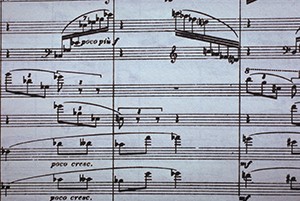The incredible power of music in history
by Jill Mattson —

Sound and music are chock-full of hidden energy. Music is invisible, but its powers are greater than we ever dreamed of.
Throughout history, music has been used for a variety of purposes, but many of these have been forgotten and lost. Work chants were used by sailors, field workers, slaves and soldiers to increase their productivity. The musical rhythms created patterns of organization and controlled movement for an activity such as rowing a boat. It created unity and cooperation among the workers and set a work pace. It also helped people focus on the music instead of their tedious, arduous work.
Some music gives people a sense of unity and identity, as in “this is our song,” or with songs for a sports team, a group or a nation. Jingles can persuade people to accept a certain point of view. They are used extensively in China to promote political points of view and in advertising to encourage people to buy products.
When ancient conquerors entered a new land, they quickly outlawed local music because it strengthened identity in a culture and its old ways. The Russians did this in Finland during World War II, outlawing their cultural music, as it gave the local people courage and strength.
Music has more power than we give it credit for. Special uplifting music can change a person’s outlook, creating a window to heaven — a new way of feeling and thinking. Ancient people referred to music that altered and uplifted a person’s consciousness as the “music of the spheres.”
Author Viola Pettit Neal wrote about a novel use of music: “The conquest of evil will ultimately be accomplished by use of rituals of sound and form. For evil is that which is disharmonious and cannot exist in harmonious patterns of sound and form. The word ‘ritual’ in its true definition is an orderly movement of sound and geometrical form in sequential patterns.” Neal suggests that harmonious music can overcome disharmony (evil).
Many African tribes surround someone who has behaved badly, singing their name and personal song to them to reestablish harmony. It makes sense that Osama bin Laden outlawed music for his followers. It certainly would be difficult to prepare for a suicide-bombing mission while you were humming a breezy Beach Boys tune. Such harmony would make it nearly impossible to persuade people to perform heinous deeds.
Could we use music to change people who have done unscrupulous things? Why not use harmonic and healing music in prisons, with children in trouble or businesses with poor reputations where negotiations are taking place, or how about on a war front? How serious could people be about fighting if everyone was singing “Silent Night?”
Research has shown that people easily believe others in a distant country are enemies if they do not know them. In contrast, if they know about the people, they do not want them to be hurt. What about sharing songs from countries to lessen international tension? If people like a country’s music, it might be more difficult to demonize their people as the enemy.
The people of Estonia, a small Romanian country, had been slaves for thousands of years and, as slaves, they were demoralized. When the abusive czars were shot, they saw their chance for freedom, but lacked courage to seize the opportunity. In a country of only a million people, half of them sang nonstop for a week. The energy created from singing realigned their will, determination and spirit. They rose up and boldly regained their freedom.
Shortly after Hitler took control of Poland, Russia overpowered the Romanian countries. Under Stalin’s rule, about a third of Estonians were randomly forced to work in Siberia where most died. This practice terrorized the people. Later, Hitler, as well as the Russians, enslaved Estonian men and forced them to fight against each other, with brothers killing brothers. Pain colored the Estonians with fear, shame and horror — once again breaking the spirit of the people.
After World War II, the Russian occupation created harsh conditions — little food, no jobs, no places to live and plenty of fear. When the communist regime fell, the Estonian people found themselves again beaten down with no strength to unite or fight back.
The people came together with a song festival for five days, with a half million people attending. Afterwards, the Estonian people gained their freedom, crediting their courage to the energy created by singing. To this day, they hold a song festival every five years.
Sound and music are chock-full of hidden energy. Music is invisible, but its powers are greater than we ever dreamed of.
Jill Mattson is an artist, musician and author in the field of Sound Healing. She has written four books and produced six CDs that combine sound healing techniques with her musical compositions. The CDs consist of sound energy and frequencies to achieve profound benefits. jillswingsoflight.com, musicforbeauty.com and jillimattson@yahoo.com.
Reprinted from AzNetNews, Volume 34, Number 5, October/November 2015.





November 23, 2015
Featured, October/November 2015 Issue